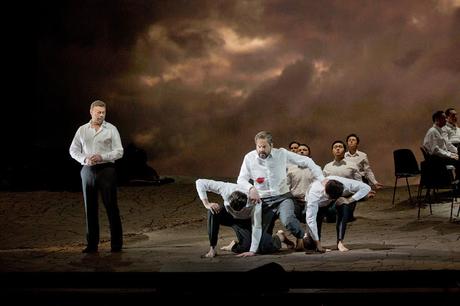by Paul J. Pelkonen

Rene Pape (left) and Peter Mattei (center) return to the Metropolitan Opera's revival of Parsifal.
Photo by Ken Howard © 2013 The Metropolitan Opera.
What is Parsifal?
This is Richard Wagner's final work for the stage, and the only work specifically written to be performed in the Bayreuth Festspielhaus, the composer's custom-built theater in Germany. Based on a medieval epic Parsifal is a slow, lengthy meditation on the meaning of suffering and the promise of redemption, centered around the legend of the Holy Grail. Wagner, who referred to his work as a "stage consecrating festival play", intended Parsifal to be his legacy. He insisted that the opera only be performed at his theater. The first opera company to break that embargo was the Metropolitan Opera in 1903, twenty years after Wagner's death.
What is Parsifal about?
Parsifal is set in no particular time and no particular place. It is the story of the kingdom of the Holy Grail, which is thrown into disarray after its king, Amfortas suffered a crippling wound. A knight must retrieve the sacred Spear which caused the wound, but all attempts have failed. The last resort is Parsifal, an "innocent fool" who blunders his way into the kingdom but ultimately gains the wisdom and compassion to save the King and the Knights of the Grail.
Why should I see it?
If you like Wagner, you should see it. It's absolutely essential. If you've never been to a Wagner opera this may not be the ideal "first" but it has very beautiful music. Here, the conductor is Metropolitan Opera music director designate Yannick Nézet-Séguin, leading his first Parsifal performances at the Met.
What's the music like?
Parsifal starts with a long, slow Prelude. The first act unrolls an hour or so of exposition before the events of the opera actually step into (slow) motion. The second and third acts are powerful and propulsive. In this last score, Wagner's intent was to remove the ideas of "time" and "place" from the events on stage. The libretto also reflects this, as there are no indications of how long ago the wounding took place, how long it takes Parsifal to complete his quest or most importantly how long Amfortas has been suffering. A performance can vary in length by as much as an hour.
Who's in Parsifal?
Klaus Florian Vogt returns to the Met to sing the title role. The astonishing bass René Pape is Gurnemanz, the curmudgeonly knight who sings most of the Act I exposition. Peter Mattei returns to the role of Amfortas. Evelyn Herlitzius is Kundry, the cursed woman who stands in Parsifal's path.
How's the production?
This staging portrays the Grail Knights as a very rigid, gender-sequestered, quasi-religious community. The second act features a collection of spear-wielding flower maidens in long white dresses, who defend a lake of blood. The blood is the most memorable thing about François Girard's staging. The director combines projections, lighting and carefully textured sets to give the rocks and walls an almost organic feel.
When does the show open?
The first performance of Parsifal is February 5. Please note that all evening performances start at 6pm.
Where do I get tickets?
Tickets are available through MetOpera.Org or by calling the box office at (212) 362-6000. You can save service fees by going to the box office in person at the Met itself, located at 30 Lincoln Center Plaza. Hours: Monday to Saturday: 10am-8pm, Sunday: 12pm-6pm.
Which recording should I buy?
There is a complete Superconductor guide to Parsifal for you to read. The following is an excerpt from its recording recommendations:
Bayreuth Festival Orchestra and Chorus cond. Hans Knappertsbusch (Philips-Decca 1962)
There are six different accounts on CD of Parsifal conducted by this great German conductor. But this is it. The legendary stereo Parsifal which captures every detail (including coughs!) of being in the Festspielhaus and listening to "Kna" work his mystic way with the score. An excellent cast is present, with Hans Hotter singing a Gurnemanz for the ages, Jess Thomas as a strong Parsifal and George London a shattering Amfortas. The live acoustic is all-enveloping, and even the odd cough from the audience lends to the theatrical atmosphere.
Bayreuth Festival Orchestra and Chorus cond. Pierre Boulez (Deutsche Grammophon 1971)
Another Bayreuth effort, and the shortest recording of this opera in the catalog at three hours, thirty-eight minutes and thirty-eight seconds. Pierre Boulez shows the same understanding of the Bayreuth sound and the transparent quality of the music that would inform his later Ring cycle. James King and the young Gwyneth Jones make real heat as Parsifal and Kundry. Thomas Stewart is an excellent Amfortas.
Vienna Philharmonic cond. Sir Georg Solti (Decca 1972)
The orchestra plays this music as if born to it. Christa Ludwig is the most seductive Kundry on record, and the second act features a starry trio of Flower Maidens. Rene Kollo is OK as Parsifal. Dietrich Fischer-Dieskau is an odd choice as Amfortas. The star of the show: Gottlob Frick who enunciates and nuances the meaning of every word in Gurnemanz' monologues, making them anything but boring.

